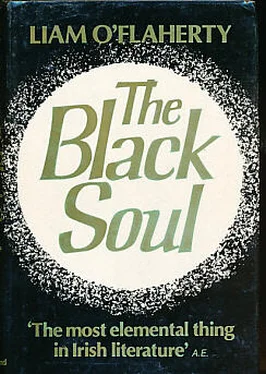Summer purred about him heedlessly. He reached the cliffs and lay down flat on a green hillock. A grassy plot of ground sloped down to the summit of the Hill of Fate in front of him. It ended in a broken fringe of slaty earth, and then there was a drop of two hundred feet. A short slippery stretch of rabbit-eaten grass lay between him and a headlong fall into the sea and death. He had but to close his eyes and let himself slip, down the grassy slope, then through the silent air, and he would sink into the sea and forget everything. But would it end there? …
‘Look here,’ he said to himself, and upright ridges appeared in his forehead as he frowned. ‘I must get out of here. Look at the mess I am in now.’ His misfortunes overpowered him. They towered over him. It was as if millions of people surrounded him, yelling at him, as boys yell at a confused and encircled rabbit, like a beautiful Magdalen at the mercy of a jury of ugly respectable women. He was afraid both of life and of death. He wanted some way of escape that did not mean suffering or effort. And nature that scorned weakness or cowardice presented none. She asked none herself, coming from the frozen sleep of winter through the icy grip of spring to the languorous ease of summer. And then his weakness struck him in its entirety. He began to analyse his difficulties and they vanished. ‘I have a love-affair with a peasant’s wife,’ he laughed, ‘and I make a mountain of it. I am a great big fool, a strong healthy idler, wasting my time and …’ But his heart revolted at this profanation of the feeling towards Little Mary, which he felt to be too sacred for mockery. Ha! It went deeper than reason. No matter how deeply he tried to bury it under a mound of jeers and arguments and abuse, it sang down there within his breast, causing his being to throb. It said, ‘I am here. You can’t deny me. I defy your brain. I am nature. I am beyond your understanding. You must submit to me, or you perish. Only nature that begat me can destroy me.’ And jumping to his feet he said, ‘To hell with everything. I am going to enjoy myself.’
That evening he sat with Little Mary by the hearth, murmuring soft phrases, stroking her hair, making promises, telling her how beautiful she was. And sometimes, when his reason sneered, saying, ‘You can’t mean what you say. It is a lie, a lie. Love is a profanity. It is against common sense,’ he smothered the sneers with a laugh. Sitting in front of the fire, where two sods of turf smouldered silently in their yellow ashes, he talked eloquently of their future together. He tried by the very fury of his words to overwhelm his Black Soul that sat gloomily within him saying, ‘What a fool you are. It’s all a lie. You’ll think otherwise in a year’s time, tomorrow perhaps. How are you to know that she loves you? She only wants to use you in order to get away from here. She is making a tool of you, you idiot. All women are base and deceitful.’ He fancied he could see his Black Soul smirking through a fleshless skull in a cavern of his brain. But his words, coming from his heart, talked of tearing the world to pieces and refashioning it beautifully for his beloved, as beautiful as the surface of the sea in summer, with sunbeams gleaming on it. He talked, looking at the ashes, his eyes gleaming, his right hand gesticulating with the fingers outstretched like an eagle’s claws, and his left hand about her waist.
With her head leaning on his shoulder Little Mary scarcely heard his words. The sound of them wafted her into her own dreams. And her dreams were of the children of her love. She cared nothing for his dreams of greatness, but as the setting for the life that was to be, the real life of love, a child from her womb, the living expression of her love for him. For her he was then but the medium of love. Her brain knew nothing of the love of civilization. She knew but the love of nature, that obeys nothing but the blind instinct to fulfil its function and shatter the tool that has achieved its purpose. And he was trying to compromise between his brain that desired to be godlike, and his heart that talked honeyed words, stolen from the god’s brains, to entice a woman in the net of his desire.
In the days that followed he tried to find that compromise between his brains and his heart, that level where he could love her without regret, and he could not. Each day merged into the next languorously, and he could decide nothing. He swayed like the pendulum of a clock from love to cynicism and from cynicism to love. When Little Mary begged him to take her away he would say, ‘Why rush at things? We are all right as we are for the present. Something must happen shortly. I will fix on a plan, my treasure.’ And all the time he knew that the reason that he did not take her away was because she did not satisfy his reason. He could not abandon himself to her. He was perpetually doubting her. He would say, ‘Her loss would make no difference to me. Therefore I don’t love her. And she would never understand me.’ And yet when he had her in his arms he forgot everything in his love for her. That strange feeling of humility and purity would overmaster him, so that he often fell down at her feet and wanted to worship her. But as soon as he was alone his doubts came back again, so that he was in continual torment. For days at a stretch he would lapse into silence, merely staring at her coldly when she spoke to him, all the while trying to decide what to do with her, and whether he loved her or not, and without ever being able to arrive at a decision. In fact, the more he reasoned the more intricate the problem became. It was beyond the power of reason.
He spent most of those days on the pier, at the westward end of Coillnamhan harbour, where the boatmen from the mainland were selling turf. The pier was crowded every day by peasants buying turf or carting it home or just loafing. In summer it was perhaps the most beautiful spot in Inverara, by the harbour that ran like an azure streak through the grey rocky shores to the white sandy beach, with the green valley of Coillnamhan beyond, and beyond that the grey, sun-scorched crags rising in terraces to the cliffs. He trudged down each morning along the pier, through the brown turf dust to the farthest point. There he sat among the peasants, with his legs dangling over the wall, listening to the conversation and watching the sea. And the time flew. At one moment it would be high tide, with the sea reaching to the highest step of the iron ladders that ran down the sides of the pier and licking the base of the great rock that lay half-way up the beach at the western end. The next moment, as it seemed, it would be low tide, and the base of the pier was dry, and one could see the patch of pebbles covered with yellow moss in the centre of the strand, far out. And yet six hours would have passed. The peasants would yarn and say, ‘Oh, my God, is it that time.’ Then they would lie down again with their backs against a heap of turf and their hats over their eyes, revelling in luxurious idleness after the fierce struggle with spring. Sometimes they would look at the Stranger curiously and say, ‘They say his soul has been bought by the devil.’ Another would say, ‘Don’t talk of him. They say he casts the Evil Eye. Did you notice Red John lately?’ Yet they talked to him with that peculiar contemptuous respect that the peasants of Inverara have for strangers whom they do not understand and despise inwardly because they are different from themselves, and are not known to possess land. ‘What is he, after all?’ they would say behind his back. ‘Why, I tell you, he is a worthless fellow. His father was a devourer of books (the peasants’ nickname for a schoolmaster), and he himself, they say, is just a useless fellow. Why, he can neither sow nor fish. By the Virgin, what queer people there are in the world. By the Book, there are. There now.’
Читать дальше












